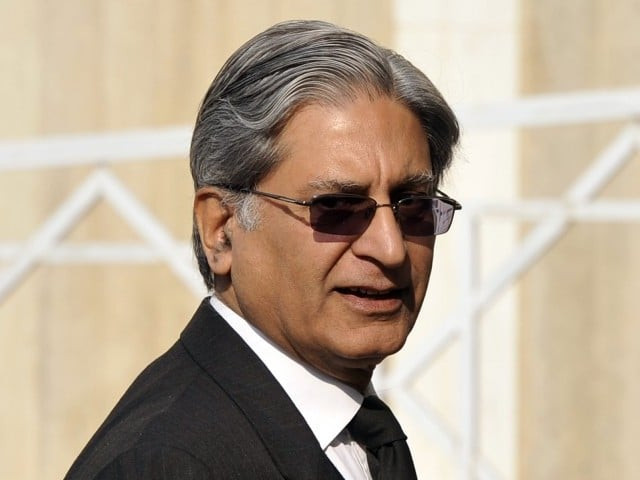SC urged to give right of appeal against verdict in suo motu cases
Argues giving litigants right of appeals against judgments under Article 184(3)

Advocate Aitzaz Ahsan. PHOTO: FILE
The apex court has used the article to initiate proceedings in public interest matters.
Aitzaz Ahsan, while appearing before a five-justice larger bench headed by Chief Justice of Pakistan Mian Saqib Nisar in a public interest matter related to a land dispute, said they (lawmakers) tried to amend the article but failed.
Bar groups clash over appointment of law officers
This followed an interesting debate between the senior lawyer and the chief justice of Pakistan.
The chief justice said, “Lawmakers may use their powers to amend this constitutional provision,” adding, “Later, the court will examine if parliament has the power to amend Article 184(3) or not.”
“We (lawmakers) tried but failed to amend the article,” Ahsan replied.
“Many people are angry with the Supreme Court by its use of the power under Article 184(3) of the Constitution,” the lawyer, who played a leading role in the movement for the restoration of judges in 2007, said.
The chief justice replied, “Only those will get angry whose misappropriation is coming to the surface in view of these public interest litigations.”
It is to be noted that the Supreme Court in a majority judgment in the 21st Amendment case ruled that the top court can review constitutional amendments to see if they are not in conflict with independence of the judiciary.
The Pakistan Bar Council has passed several resolutions to amend Article 184(3) to ensure fair trial and due process of law in view of Article 10-A of the Constitution.
Recently, Law Minister Dr Farogh Nasim has said he did not support the idea of right to appeal against judgments rendered by the apex court under Article 184(3) of the Constitution.
Justice Siddiqui asks SJC to hold open trial
“There was no need to amend the jurisdiction used by the Supreme Court in matters of public interest,” he had said and added, “The right to appeal can be counterproductive, creating unnecessary delays.”
The law minister also defended the chief justice of Pakistan’s discretionary powers to set up benches and fix cases.
Nasim gave an impression that he was a strong supporter of judicial activism.
However, his view on Article 184(3) is in conflict with major mainstream political parties that are convinced that the right to appeal should be allowed in suo motu cases.
The PPP’s manifesto stated that Article 184(3) had been used in ways that “did not inspire great confidence in its use by courts in human rights issues”.
“This article will be revisited in the light of Article 10(A) of the Constitution, introduced through 18th Amendment, guaranteeing the right to fair trial, observations and recommendations of International Commission of Jurists (ICJ) and various bar bodies in the country,” the manifesto stated.
The Supreme Court, while exercising Article 184(3) jurisdiction, has disqualified a number of lawmakers for lifetime.
However, they were deprived of the right of appeal. A review has very limited scope in challenging the judgment rendered in public interest matters as the same judges who give the original judgment hear the review petitions.



















COMMENTS
Comments are moderated and generally will be posted if they are on-topic and not abusive.
For more information, please see our Comments FAQ